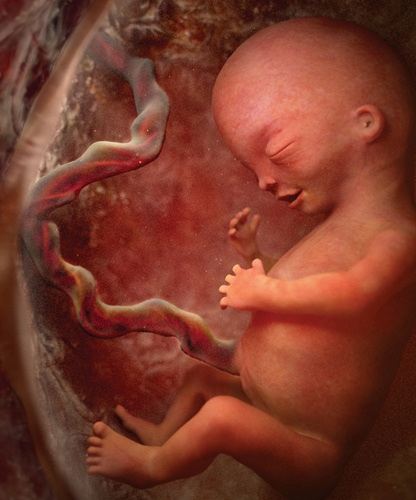You are 11 Weeks and 5 Days 198 days to go…
Having your first scan this week and knowing your risk of miscarriage is reduced now, should mean you can start to relax.
Your baby today
At this stage the eye—not yet in its final position—still
dominates the appearance of the face. The eye is not yet responsive to
light and remains well protected behind the covering eyelid.
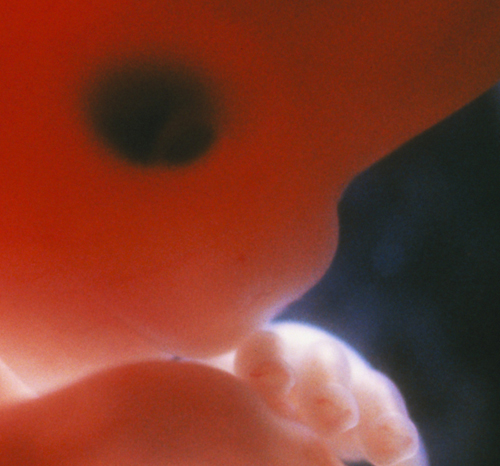
This can be a very positive time for you,
especially if you’ve been anxious from day one of your pregnancy. The
risk of miscarriage falls as your pregnancy progresses and by the end of
this 12th week, it’s no more than 1 percent.
As you enter the second trimester, you should begin to feel better (see You are 11 Weeks and 6 Days),
and this, combined with the knowledge that you have passed the most
risky time, may help you relax. If you’ve been keeping your pregnancy a
secret, you can also enjoy telling others.
… Safety
Safe scans
Ultrasound has been used for years
and is thought to be safe. Children who’ve been exposed to prenatal
ultrasound do not have differences in speech, hearing, vision, or school
performance, or an increased risk of cancer. However, ultrasound should
only be done when necessary.
… Nutritionist
| Q: |
I have a really sweet tooth. Is it okay to indulge this while I’m pregnancy?
|
| A: |
While occasional treats of cookies or chocolate are fine,
processed foods usually contain hidden fats and sugars and provide few
nutrients, so it’s best to try to find healthier sweet alternatives to
snack on, such as fresh fruit.
Always read
food labels and look for alternative foods containing less fat and less
added sugars. Just as you would consider carefully how you feed your
child, you should take care of yourself in the same way while you’re
pregnant.
One of the best ways
to curb your sweet tooth is to eat regular meals. This helps to steady
your blood-sugar level and reduce sweet cravings. Try not to go longer
than three hours without eating and, if you’re hungry, have a healthy
snack between meals, such as a chicken sandwich, a low-fat yogurt, or
fruit, which can be fresh, canned, or dried, such as raisins or
apricots.
Try to drink about
two quarts of water a day, since perceived hunger is often really
dehydration. Drinking a glass or two of water may stop you from reaching
for the cookie jar.
|
It’s possible to satisfy sweet cravings with refreshing fruit. You may find that you feel better after eating a fruit salad than if you eat a bar of chocolate.

Medical ultrasound has been used since the early 1960s.
However, the first
discovery of high-frequency echo-sounding techniques, on which
ultrasound is based, was as long ago as 1880 in Paris. In the early 20th
century, ultrasound was used as a therapy tool and it was not until the
1940s that research began into its use as a diagnostic tool.
You are 11 Weeks and 6 Days 197 days to go…
If you’re finding you’re out of breath when you get to the top of the stairs, accept this as a normal side effect of pregnancy.
Your baby today
The bones of the front of the skull have continued to expand and
cover the head, protecting the delicate brain structures beneath. The
soft spot in between the skull bones (center) remains through pregnancy
and into babyhood.
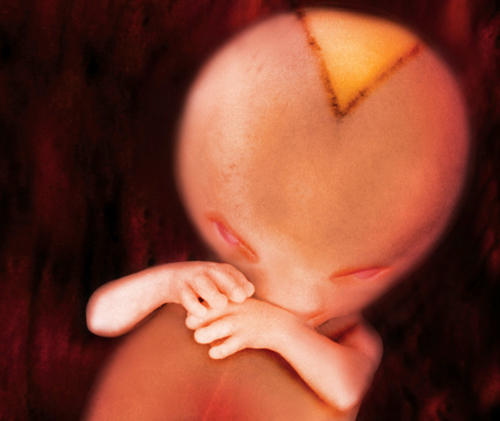
By the end of the first trimester
it’s normal to begin feeling a little breathless. This is because your
heart and lungs are having to work much harder to supply your body with
oxygen due to all the changes that are taking place to allow the baby to
grow.
The amount of oxygen you need in pregnancy is about 20 percent more than normal; some of this goes to the placenta (see You are 10 Weeks Exactly)
and baby and the rest to your other organs. To get this increased
amount of oxygen you breathe faster and deeper, almost hyperventilating
so you feel short of breath, especially when you exercise.
As your pregnancy
continues, you may find that this shortness of breath or feeling that
you are not breathing very deeply continues, or worsens. As the baby
grows, your uterus will expand upward and your other abdominal organs
will rearrange themselves to create more room. Your organs and uterus
push up against your diaphragm so it becomes more difficult to take a
deep breath, so in order to get all the oxygen you need, you then have
to breathe much faster. The hormone progesterone may also affect the
rate at which you breathe.
If you have any concerns about breathlessness, don’t hesitate to speak to your doctor.
Some of your usual vitality should begin to return toward the end of the first trimester.

… Health
Feeling better?
By the end of this trimester, many of the early pregnancy symptoms are likely to have passed.
Nausea
may have begun to lessen and it can be a complete relief to wake up in
the morning without feeling sick. Your loss of appetite will return, and
you can stop worrying about whether your baby is being properly
nourished, which is often a common concern for women who suffer from
morning sickness.
You won’t need to urinate
quite so often, which will be good news if you’ve spent an inordinate
amount of time in the bathroom. This is because your uterus is now
moving up the abdominal cavity and therefore is placing less pressure on
your bladder.
The fatigue
that you may have felt in these early months is likely to have lifted
by now, and you may be sleeping more deeply now that you’re relaxing
into your pregnancy.
If your sickness hasn’t passed yet, don’t worry—for some women, it does last longer.
… Doctor
| Q: |
I’ve gone from an A cup to D cup. Will this increase in size last forever?
|
| A: |
The majority of women who have had babies do report a
permanent increase in breast size but it’s unlikely to be to this
extent! The effects of estrogen cause fat to be deposited in the breasts
and when your milk comes in after the birth your breasts will get
bigger, but reduce again once you have stopped breast-feeding.
|
You are 12 Weeks Exactly 196 days to go…
You’ve reached the end of the first trimester and in this time your baby has developed from a ball of cells to an active fetus.
Your baby today
Here the legs are crossed and the arms outstretched. The
umbilical cord is short and thick at this stage, but will lengthen as
the baby grows, and become much thinner with many coils.
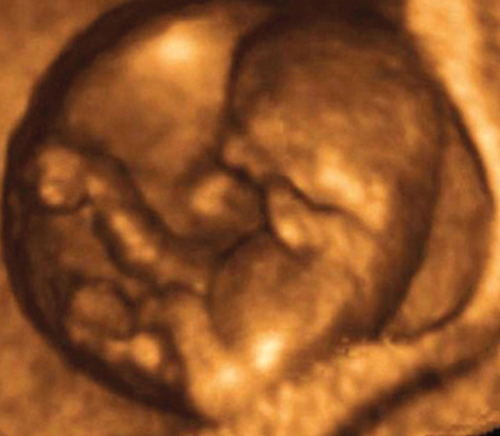
Your amazing baby can do so many things already,
including being able to open his mouth and yawn, hiccup, and swallow.
Swallowing develops earlier than sucking. Your baby will be swallowing
the amniotic fluid regularly but the more complex sucking movements
cannot be identified until 18–20 weeks. Swallowing will encourage gut
development. The amniotic fluid enters into the stomach not the lungs,
which are protected now by the vocal cords and the higher pressure of
the lung’s own fluid. The amniotic fluid will later be excreted as urine
when the fetal kidneys start to function.
After the stomach, the
amniotic fluid will enter the small bowel. The intestinal walls are
developing muscular layers but these do not yet contract in a
coordinated way to move the fluid along the digestive tract. It will be
20 weeks before the structural organization of the gut is finally
complete. Many digestive enzymes are starting to be released into the
gut but these currently act as a stimulus to development rather than for
the absorption of nutrients.
Your baby is reliant
on a steady stream of glucose, which is stored as glycogen in the liver.
This continues throughout pregnancy and at birth your baby will, for
her size, have significantly larger glycogen reserves than adults do.
The correct level of glucose is controlled by insulin secreted by the
pancreas. The placenta, however, has little control over the amount it
takes from your blood-stream and passes on. For this reason if your
glucose level is very high, for example in poorly controlled diabetes,
the baby will be presented with high levels of glucose. He will maintain
a normal glucose level but the insulin released leads to increased fat
deposition and weight gain.
Your doctor
Most women develop a good relationship with their doctor, who can be a fountain of fantastic information, and a wonderful source of comfort and reassurance.
It’s important
that you are as honest as you can be with your doctor. Like many women,
you may be reluctant to reveal concerns, or to admit to unhealthy habits
for fear of being embarrassed or scolded. It’s very likely that your
doctor will have heard it all before, and will be able to help and
advise—with a few tried-and-tested tricks up her sleeve.
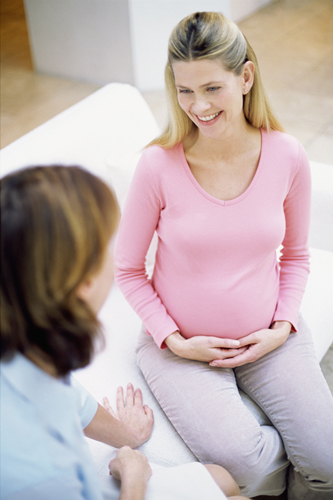
Actual size of your baby
At 12 weeks your baby’s crown to rump length is 2.4 in (6.1 cm).
9 weeks
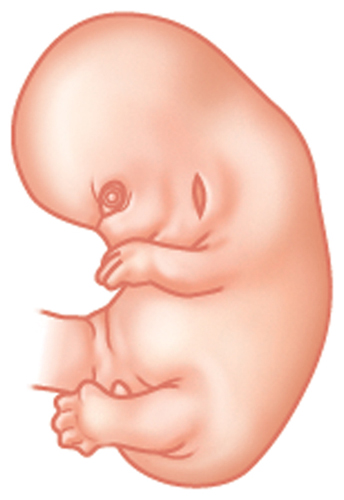
12 weeks
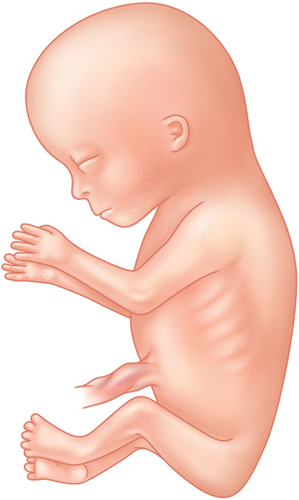
All your baby’s organs,
limbs, and facial features are in place, but her head is still
disproportionately large. She can open and close her mouth, and her eyes
are developing behind closed lids.
